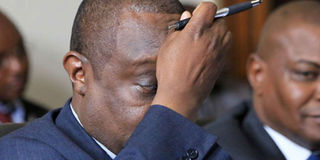Government will lose billions if MPs shoot down Uhuru memo

Treasury Cabinet Secretary Henry Rotich before the Finance and National Planning Committee of the National Assembly on September 19, 2018. PHOTO | JEFF ANGOTE | NATION MEDIA GROUP
What you need to know:
- Areas targeted in the memorandum include the eight percent levy on fuel products, that will see about 17.5 billion realised, money transfers (Sh11.4 billion), betting companies and winners (Sh30 billion), and the housing fund (10 billion).
On Tuesday, the National Treasury presented supplementary estimates to the House, proposing to slash its Sh3.026 trillion budget by about Sh55 billion.
Yesterday, National Treasury Cabinet Secretary Henry Rotich pleaded with the MPs to consider the bill with the president’s proposed changes.
The government risks losing about Sh100 billion it badly needs to fund this year’s budget, if MPs gang up to shoot down President Uhuru Kenyatta reservations on the Finance Bill.
Among areas targeted in the memorandum are the eight percent levy on fuel products that will see about Sh17.5 billion realised, sugar confectioneries (Sh475 million), money transfers (Sh11.4 billion), betting companies and winners (Sh30 billion), the housing fund (Sh10 billion) and kerosene (Sh9.8 billion).
HUGE DEFICIT
On Tuesday, the National Treasury presented supplementary estimates to the House, proposing to slash its Sh3.026 trillion budget by about Sh55 billion.
If the MPs make good their threat to shoot down the president’s proposals during a special sitting on Thursday, it will leave the government sweating over how it will plug the huge deficit in the budget.
Of the entire budget, the Kenya Revenue Authority is only able to raise about Sh1.6 billion in ordinary revenue - including VAT on fuel products that the MPs have openly opposed on account that it will overburden the already overtaxed Kenyans.
On Tuesday, President Kenyatta formerly cited his reasons for returning Finance Bill, 2018 to MPs for reconsideration.
The bill - which was passed two weeks ago - gives the government the legal framework to finance its budget.
ROTICH'S PLEA
Yesterday, National Treasury Cabinet Secretary Henry Rotich pleaded with lawmakers to consider the bill with the president’s proposed changes.
“We reformed the tax law in 2013 because almost everything - about 435 items - were tax exempt. This was done to expand the tax base because over time, we have been losing revenue because of the narrow tax base,” Mr Rotich told them.
The committee chaired by Kipkelion East MP Joseph Limo is considering the president’s memorandum on the bill, that has also proposed to delete the 0.05 percent 'Robin Hood' tax, which had been proposed on money transfers of at least Sh500,000.
The CS announced that the government plans to recoup lost revenue through the 20 percent imposed on the charges the banks levy customers in money transfers, meaning the transfer charges could still go up.
There is also a new proposal to increase the price of kerosene by Sh18 per litre, to check adulteration of fuel, as well as split the current 35 percent tax on betting companies to include the winners.
MITIGATION MEASURES
But even as the government does this, it is yet to take mitigation measures - zero rating of liquefied petroleum gas (LPG) and increasing cheap electricity connections - to cushion the poor against the high prices.
Currently, the government is only able to raise about Sh8.7 billion in the betting industry.
This will see betting companies charged 15 percent on top of the 30 percent charged in terms of corporate income, and winners 20 percent.
“This is a punitive taxation measure. If you want to engage in the luxury of betting, you give the exchequer money,” Mr Rotich said.
THE VOTE
The committee is required to table a report recommending the adoption or rejection of the changes.
It will require at least two thirds or 233 of the 349 MPs to either alter the president’s view or shoot it down all together.
The MPs were also united against the taxes on sugar confectioneries, arguing that it will make the country uncompetitive in the region in the manufacturing of sweets, biscuits, chocolate and other such products.
“Why discourage local manufacturers?” Mr Limo posed. “Kenya is the centre of confectionery in the East African region. This levy may lead to uncontrolled importation,” he said.
Mr Rotich explained that the levy on the confectioneries is one of the sin taxes imposed by the government to regulate the consumption of such products.
He argued that the cost of treating complications related to the consumption of the products far outweighs the benefits.
“We are complaining about the tax yet we are spending more on health challenges. By discouraging this, you are protecting the health of Kenyans, including children. This provision is meant to raise revenue for development,” Mr Rotich said.
“These are the recommendations of the World Health Organization (WHO) and it is where the world is headed.”




